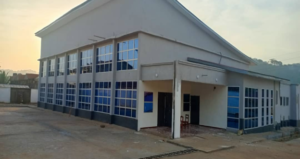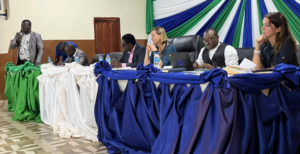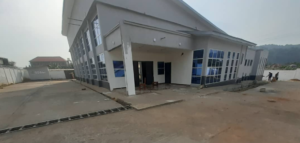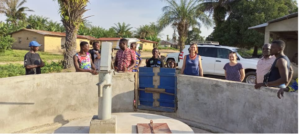Caption:New multipurpose facility in Kenema funded by the European Union
In the intricate tapestry of Sierra Leone’s progress, the true architects of success in the districts are the councils, steering the course of development initiatives in NGOs, bilateral and multilateral organisations, and even the central government. Their knowledge in the local context is the actual cogs that drive development forward. European Union (EU) funded initiatives are no exception to the local councils’ ability to make projects work and be sustainable. For this reason, the EU prioritises its relationship with local councils.
At the forefront of this relationship is the ongoing Support to Civil Society and Local Authorities for Local Development in Sierra Leone project implemented in Bombali, Kambia, Karene, Falaba, Pujehun and Kenema districts. For five years, this initiative aims to fortify democratization, uphold the rule of law, foster long-term stability, promote equitable growth, reduce poverty, and champion integrated local development strategies with a gender-sensitive approach.
The district councils have been pivotal in shaping the trajectory of these projects. Through consultations and feasibility studies, local councils have proactively highlighted critical needs, steering project designs towards tangible impact. Their knowledge of issues on the ground adds so much context to every initiative, especially as they occupy a dual capacity as implementers and beneficiaries.
In Kambia, for example, residents identified the urgent need for a bridge over a major river, unlocking possibilities in a previously impassable swampy area. Local voices echoing concerns spurred additional attention from project engineers, combining local oversight, expert skills, and international funding for clear benefits and sustainable outcomes. Today, the bridge has connected a whole community to a world of opportunities on the other side without the risk of injury or death by drowning.
Farmers can access markets quickly; children walk to school in a relatively safe environment, and even pregnant women access antenatal care just across the bridge.
An official of the Kenema District Council said the new EU-funded facilities being erected are a very welcomed idea. He said the multi-purpose hall especially comes when the demand on the council hall to host public events is overwhelming. The new hall is expected to be one key revenue stream that would increase the Council’s revenue base while supporting service delivery. This will reduce the dependence on the central government for revenue, which hugely undermines the actual essence of local governance, thus undermining service delivery.
“Kenema District now has an ultra-modern venue to host major national and international events, equivalent to venue standards in the capital city. The council welcomes every support from the EU to enhance its investment component. The revenue from this multi-purpose hall, and also the funeral home, will hugely enable the Council to be financially sustainable, thus delivering on its annual work plan and its strategic development plan. Who knows, we could be in that position to be able to contribute financially to the central government.” Said Mr. Patrick Jakema, Deputy Chief Administrator at Kenema District Council
Moreover, Bombali, Pujehun, Kambia, and Kenema proudly boast of transformative projects such as over a hundred new water wells managed by local structures. These wells are not just sources of clean water but symbols of community resilience. Water promotes hygiene, health and sanitation. The construction of markets has breathed new life into local economies, providing vibrant spaces for commerce and trade. Student hostels are beacons of education accessibility, ensuring the youth can pursue their academic aspirations.
The innovative approach extends to a funeral home, a testament to the project’s commitment to holistic community development. This facility meets a vital need and reflects the district councils’ responsiveness to their communities’ specific requirements.
Community satisfaction remains the cornerstone of project success. Involved from inception to implementation, the district councils foster a sense of responsibility, making each project a communal asset fully embraced and enjoyed by the people.
Lameck Siage, project expert, echoes the sentiment, emphasizing the need for a management system that ensures sustained and long-term success. “We are not only hoping these projects will be exciting from the beginning but not die out as many have done before. We want to have a management system that ensures they are maintained and are sustainable in the long run.”
Decentralization, with a focus on local revenue generation management, stands as a key goal of the EU’s Support to Civil Society and Local Authorities for local development in Sierra Leone programme. The EU remains steadfast in its commitment to empowering district councils through capacity and infrastructural development, embodying a partnership that uplifts and celebrates the resilience and success of Sierra Leonean communities at the local level.





